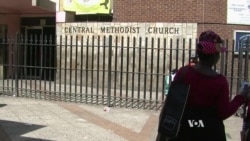At least several hundred Zimbabwean refugees who’ve found shelter at the Central Methodist Church face an uncertain future after church authorities ordered them to pack and get out.
For years, the church has been a haven to the homeless.
It had opened its doors to thousands of refugees who had fled to South Africa after the 2008 Zimbabwean elections, which were marred by violence between supporters of President Robert Mugabe and those of opposition leader Morgan Tsvangirai.
The xenophobic violence that erupted in South Africa later that year forced hundreds more to flee their homes and seek refuge in the church. Its welcoming role even was chronicled in Christa Kuljian’s 2013 book "Sanctuary: How an Inner-City Church Spilled Onto a Sidewalk."
But years of heavy use – with people sleeping on stairs, in chapel corridors and all available spaces – have taken a toll on the brick structure, church finances and the occupants themselves, according to the local Daily Maverick. Toilets often don’t work, utility bills have soared, and overcrowding has left the place worn and dingy – as well as posed health hazards.
The church’s new leader, the Reverend Ndumiso Ncombo, estimated more than 400 asylum seekers and economic migrants, largely from Zimbabwe, currently live at the church. But he and other church authorities have ordered them to pack up and find other accommodations.
"We don’t have any plans of evicting people physically," Ncombo said, but "we have closed that ministry of refugees … and we shall continue without it."
Noel Muguti, an asylum seeker from Zimbabwe, has not yet found another place to go. He said he fears that, if the church follows through with its eviction plans, he and others will be forced to sleep in the streets.
"As a refugee for many years, I am going to be more destitute by being homeless," Muguti said. "I cannot go back to Zimbabwe. I cannot be in this church. I don’t know where I will be tomorrow."
Bishop Paul Verryn, who for years had been pastor of this church before his transfer to another one, vowed no one would be evicted without some other shelter being provided.
"We have got some alternatives and nobody is gonna be treated like a piece of rubbish in this place – over my dead body," Verryn said. "This place has specifically been created to give people dignity."
But his successor, Ncombo, insists it’s time to return the building to its former glory and dedicate it mainly to song and praise.





